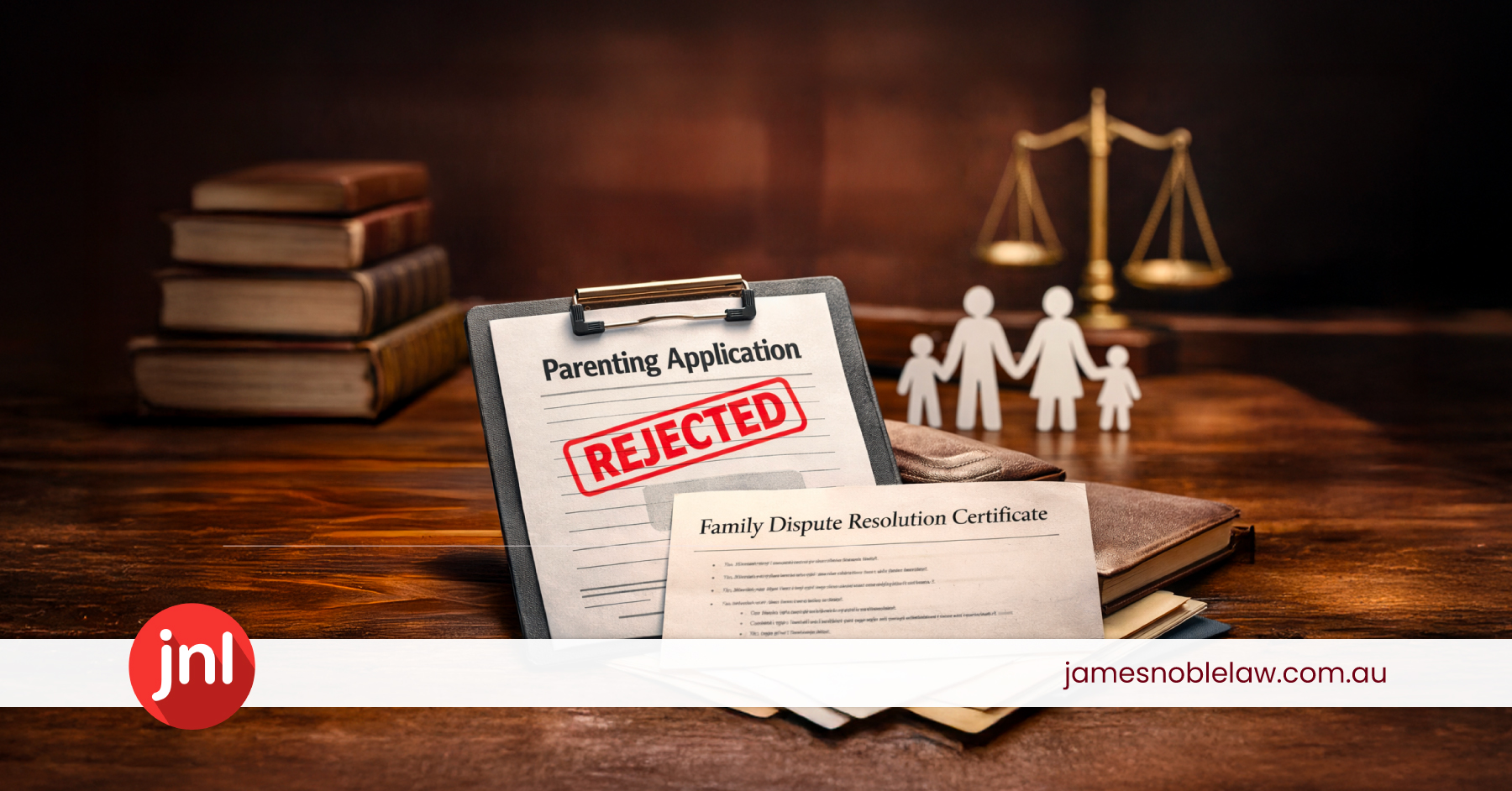Latest blog posts
When the Court Will Reject a Parenting Application: What You Need to Know Before You File
Filing an Initiating Application for parenting orders can feel urgent and overwhelming especially when children are involved. However, many parents are surprised to learn that the Court can refuse to even accept their application if certain legal requirements are not met. One of the most common reasons applications are rejected is a failure to comply with section 60I of the Family Law Act, which governs Family Dispute Resolution (FDR). Understanding these rules before you file can save you time, stress,...
Read More
A Note of Caution: Using AI to Draft Legal Documents
Artificial intelligence (AI) tools are increasingly being used across professional services, including the legal profession. From drafting submissions to summarising case law and preparing chronologies, AI can offer efficiency and convenience. However, recent court decisions and practice directions make it clear that the use of AI in legal drafting carries serious risks if not handled carefully. Lawyers remain fully responsible for the accuracy, integrity, and confidentiality of all material filed in court regardless of whether AI was used in its...
Read More
Why You Should Have an Expert Family Lawyer Support You in Mediation – Especially from James Noble Law Brisbane
Family law disputes are often emotionally draining, complex, and deeply personal. When you enter mediation, the goal is to resolve issues such as parenting arrangements, property division, or financial support in a way that avoids the stress, cost, and uncertainty of court proceedings. While mediation is designed to be less formal and more collaborative than litigation, having an Expert family lawyer by your side can significantly influence the outcome and this is where the expertise of James Noble Law in Brisbane...
Read More
How Courts Really Assess Property Contributions in Family Law Cases
Understanding Contributions in Family Law Property Settlements When a relationship ends, whether through separation or divorce, the question of who gets what becomes central. Property division under section 79 of the Family Law Act 1975 (Cth) can be complex, especially when it comes to assessing the value and weight of each party’s contributions. Contrary to widespread belief, the law does not treat property division like a balance sheet. The Full Court of the Family Court of Australia tackled this issue...
Read More
Why Legally Savvy Couples Say ‘Yes’ to a Binding Financial Agreement Before Saying ‘I Do’
When you’re in love and planning a life together, the last thing on your mind might be what happens if things don’t work out. But being prepared for the unexpected is not just smart it’s essential. Just like taking out insurance, a Binding Financial Agreement (BFA) offers peace of mind and legal clarity should your relationship end. It allows couples to define in advance how their property, assets, and financial responsibilities will be managed if they separate. At James Noble...
Read More
AI in Family Law: The Benefits and Drawbacks for Your Legal Matter
As the use and potential misuse of Artificial Intelligence (AI) becomes more common in the legal industry, courts, lawyers and legal practitioners are increasingly considering its impact on legal matters. While AI offers valuable tools for clients, including predictive analytics and the ability to efficiently review and analyse correspondence between parties, it is important to understand both the benefits and limitations of AI, particularly when dealing with the sensitive and complex nature of family law disputes. In this article, we...
Read More
Achieving Fair Outcomes: The Importance of Expert Representation at Mediation with James Noble Law
In family law disputes, particularly those surrounding separation or divorce, emotions can run high. Navigating through the complex maze of legalities, financial settlements, and parenting arrangements requires not only a deep understanding of the law but also the ability to manage negotiations effectively. For many, mediation offers an alternative to the stressful and costly court process, providing a more amicable approach to resolving disputes. At James Noble Law, we understand the challenges clients face during such emotional times. That’s why...
Read More
Why Expert Representation at Mediation is Crucial for Your Family Law Matters
Mediation is often seen as a more amicable way to resolve family disputes without the need for lengthy and expensive court battles. It offers parties the opportunity to negotiate directly with each other in a controlled, respectful environment with the assistance of a neutral mediator. However, while mediation can be less stressful and more cost-effective than going to court, it can also be complex and emotionally charged. This is where expert representation can make all the difference in ensuring that...
Read More
Can a Binding Financial Agreement Be Overturned? Here’s What You Need to Know
Binding Financial Agreements (BFAs), commonly known as prenups or financial separation agreements, are legal documents designed to give couples clarity and certainty when it comes to managing their assets and finances in the event of separation or divorce. But what happens if one party feels the agreement was unfairly made? Can a BFA be challenged or set aside by the Court? The answer is yes, but under extremely specific circumstances. In this article, we’ll break down when and how a...
Read More
Are Binding Financial Agreements in De Facto Relationships Truly Watertight? Here’s What You Need to Know
Why Legal Protection Matters in De Facto Relationships As de facto relationships become increasingly common across Australia, many couples are choosing to live together and share their lives without formal marriage. But with shared lives come shared assets, and when relationships break down, dividing property can quickly become a complicated and emotionally fraught process. Enter the Binding Financial Agreement (BFA). This legal document aims to protect the assets you brought into the relationship and clarify how property should be divided...
Read More
Break Up Without the Breakdown: Your Ultimate Guide to Consent Orders in QLD
Going through a separation is never easy - but navigating it doesn’t have to be confusing. If you and your former partner have reached an agreement on parenting or financial matters, there’s a stress-free, cost-effective way to make that agreement legally binding. Enter: Consent Orders in QLD. At James Noble Law, we specialise in helping Queensland families move forward with confidence and clarity. With over 50 years of experience in Family Law, our team is here to simplify the process,...
Read More
Domestic Violence Legal Support FAQ – James Noble Law Brisbane and Gold Coast
Domestic violence is a serious and sensitive issue that affects many people in the community. Understanding your rights and the legal protections available is an important step toward safety and healing. At James Noble Law, we are committed to providing compassionate and expert legal assistance to those affected by domestic and family violence. Below are some frequently asked questions to help you better understand domestic violence laws and how we can support you through this difficult time. Domestic Violence Legal...
Read More
Breaking the Silence: How James Noble Law Supports Domestic Violence Survivors on the Gold Coast
The Gold Coast, with its sun-drenched beaches, vibrant lifestyle, and thriving communities, is often seen as a place of opportunity and relaxation. But beneath this idyllic surface lies a harsh reality: domestic violence. It’s an issue that cuts across all ages, genders, and backgrounds, leaving deep emotional and physical scars. If you or someone you know is experiencing domestic violence, the path to safety can seem overwhelming and frightening. But it’s important to remember-help is available, and you don’t have to...
Read More
Answers to common questions about family law in Queensland
Top 10 Family Law Questions Answered by Experts at James Noble Law 1. What is family law and what does it cover? Family law in Australia deals with legal issues involving relationships, children, and property after separation. At James Noble Law, we provide advice and representation in matters such as divorce, de facto relationships, child custody, parenting arrangements, property settlements, and spousal maintenance. 2. How do I start divorce proceedings in Queensland? To apply for a divorce in Queensland, you...
Read More
Is Your Binding Financial Agreement Bulletproof? Here’s What You Need to Know
You’ve gone through the time, effort, and cost of preparing a Binding Financial Agreement (BFA) - but is it actually binding? Many people believe that once they sign a BFA, they’re protected from future disputes over property, finances, or spousal maintenance. But as numerous court cases have shown, that’s not always the case. At James Noble Law in Toowong, we’ve seen how improperly executed BFAs can be overturned-sometimes years after they’re made. In this article, we’ll explore the most common...
Read More
Why You Need a Binding Financial Agreement Before You Marry in Australia
Marriage is often seen as the ultimate romantic commitment, a beautiful union of two people who share not only love but also hopes, dreams, and a future. However, alongside the excitement of wedding planning and a new life together, it's important to consider the financial realities that come with marriage. This is where a Binding Financial Agreement (BFA) comes into play—an essential legal document that every couple should consider before walking down the aisle in Australia. What is a Binding...
Read More
What Age Does My Child Get a Say in Whether They See the Other Parent?
By James Noble Law, Queensland Family Law Experts When it comes to parenting arrangements after separation or divorce, one of the most common questions we receive at James Noble Law is: “At what age does my child get to decide whether they want to see the other parent?” This is a complex and sensitive issue that touches on the emotional wellbeing of the child, parental rights, and the legal principles guiding family law in Australia. In Queensland, as across Australia,...
Read More
Binding Financial Agreements: The Right Questions to Ask Your Lawyer First
When entering a relationship or going through a separation, financial security and clarity are paramount. That’s where a Binding Financial Agreement (BFA) may be advisable. At James Noble Law, we believe in proactive planning to protect your assets and ensure peace of mind. But the success of a BFA hinges not just on having one—but on asking the right questions before it's drafted. Knowing what to ask your lawyer can make the difference between an enforceable, effective agreement and one...
Read More
Breaking Free: How to Safely Leave a Domestic Violence Relationship in Queensland
Leaving a domestic violence (DV) relationship is one of the bravest and most life-changing decisions a person can make. At James Noble Law, we understand the fear, uncertainty, and overwhelming logistics that come with this step—especially when children and property are involved. Based in Queensland, we’re here to help guide you through this complex process with compassion, clarity, and legal expertise. Whether you’re in Brisbane, the Gold Coast, or regional Queensland, you have rights—and you are not alone. Understanding Domestic...
Read More
Facing Separation: Navigating the Complexities of Children, Property, and Wills with James Noble Law
Separation is never easy, and when your partner seeks a separation, it can feel like the ground has been pulled out from under you. Whether it’s how to tell your children, divide property, or update your Will, the emotional and legal aspects of a separation can be overwhelming. Thankfully, there are steps you can take to ensure that you handle the situation with clarity, confidence, and with the support you need. James Noble Law is here to guide you through...
Read More






















